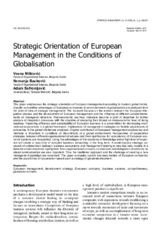Please use this identifier to cite or link to this item:
https://rfos.fon.bg.ac.rs/handle/123456789/1349Full metadata record
| DC Field | Value | Language |
|---|---|---|
| dc.creator | Milićević, Vesna | |
| dc.creator | Backović, Nemanja | |
| dc.creator | Sofronijević, Adam | |
| dc.date.accessioned | 2023-05-12T10:51:45Z | - |
| dc.date.available | 2023-05-12T10:51:45Z | - |
| dc.date.issued | 2015 | |
| dc.identifier.issn | 1821-3448 | |
| dc.identifier.uri | https://rfos.fon.bg.ac.rs/handle/123456789/1349 | - |
| dc.description.abstract | This paper emphasises the strategic orientation of European management according to modern global trends. Specific competitive advantages of European companies in an environment of globalisation are analysed from the point of view of strategic management. The research focuses on the relation between the European integration process and the development of European management and the influence of different cultural frameworks on managerial decisions. Macroeconomic business indicators become a point of departure for further analysis of integration processes with the objective of analysing their impact on microeconomic level of doing business. Improving efficiency and sustainability of European business is a precondition for developing multinational corporations in a global framework. Implications of management strategies on flexible adjustments of companies in the global market are analysed. Original contribution of European management approaches and methods is important in conditions of discontinuity of a global environment. Perspectives of cooperation strategies between different organisational structures and their significance for consistency of European economic systems are researched. Using the advantages of the economy of knowledge and a high level of expertise will create a possibility of complex business networking in the long term. A contemporary strategic approach of collaboration between business ecosystems and management relating to new business models in a dynamic environment are highlighted. Interorganisational company connections and delegation of authority by lateral communication are also important. Thus the traditional approach and the challenge of creating a new management paradigm are examined. The paper evaluates current business models of European companies and the possibilities of cooperation based upon a strategy of global development. | en |
| dc.publisher | Univerzitet u Novom Sadu - Ekonomski fakultet, Subotica | |
| dc.rights | openAccess | |
| dc.rights.uri | https://creativecommons.org/licenses/by/4.0/ | |
| dc.source | Strategic Management | |
| dc.subject | global environment | en |
| dc.subject | European management | en |
| dc.subject | European company | en |
| dc.subject | development strategy | en |
| dc.subject | competitiveness | en |
| dc.subject | business systems | en |
| dc.title | Strategic orientation of European management in the conditions of globalisation | en |
| dc.type | article | |
| dc.rights.license | BY | |
| dc.citation.epage | 57 | |
| dc.citation.issue | 2 | |
| dc.citation.other | 20(2): 49-57 | |
| dc.citation.rank | M52 | |
| dc.citation.spage | 49 | |
| dc.citation.volume | 20 | |
| dc.identifier.fulltext | http://prototype2.rcub.bg.ac.rs/bitstream/id/189/1345.pdf | |
| dc.identifier.rcub | conv_1998 | |
| dc.identifier.wos | 000420947100005 | |
| dc.type.version | publishedVersion | |
| item.cerifentitytype | Publications | - |
| item.fulltext | With Fulltext | - |
| item.grantfulltext | open | - |
| item.openairecristype | http://purl.org/coar/resource_type/c_18cf | - |
| item.openairetype | article | - |
| Appears in Collections: | Radovi istraživača / Researchers’ publications | |
Page view(s)
6
checked on Dec 28, 2025
Download(s)
10
checked on Dec 28, 2025
Google ScholarTM
Check
This item is licensed under a Creative Commons License


